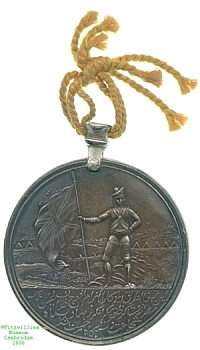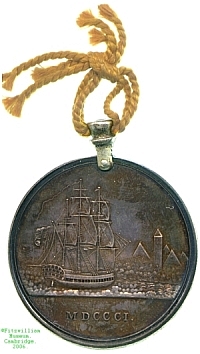
Obverse, a sepoy with a flagstaff flying a Union Jack before an encampment

Reverse, a ship under full sail, heading right, before the Pyramids

Obverse, a sepoy with a flagstaff flying a Union Jack before an encampment |

Reverse, a ship under full sail, heading right, before the Pyramids |
General Napoleon Bonaparte, in 1798 not yet in power in France, conceived the idea of attacking Egypt to cut Britain off from India and was sent to do so at least partly so as to remove him from turbulent Paris. However, facing a triumphant naval victory by Rear Admiral Horatio Nelson at Aboukir Bay, and a general lack of strategic success despite several crushing victories over Egyptian and Ottoman forces, Bonaparte returned to France in 1799 to take power by coup. French troops remained in the country until 1801, however, when a force under Sir Ralph Abercromby were dispatched to expel them. They were aided in this by a contingent supplied by the Honourable East India Company, and in 1802 the Company approved the issue of this medal for the troops who had taken part. European troops had to wait until 1848 for their participation to be recognised with a British award.
The medal appears not to have finally been issued until 1811, and then unnamed, so we do not know who the recipient of this example was. Lester Watson acquired the medal at some point before 1928.